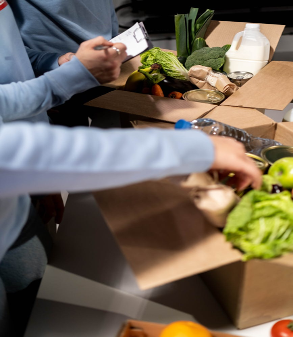Giuseppe Caira is the Owner of JC Contractors and Custom Builders and a regular volunteer at several food banks in New Jersey and Philadelphia. Food banks are a vital resource for communities and seem to have an increased importance in light of Covid-era shutdowns and unemployment. Giuseppe, known more as Joe Caira to friends and business associates, weighs in on the background of food banks in this country, and why volunteering at one can be such an uplifting experience for a person.
With over 300 food banks in the United States, the primary function of these institutions is to provide food assistance to those who need it. With hunger in the United States being at its highest point since 1994, food banks are a lifeline for more and more Americans. Is it time to view this vital entity differently?
How Does a Food Bank Work?
Food banks are distribution facilities that will warehouse, repackage, and distribute foods contributed by others to other member organizations and charities. Predominantly, food banks rely on surplus goods donated in large quantities, but there are local food drives and individual donations that are just as important.
According to Joe Caira, this breaks down into three main areas, USDA commodities, which cover a number of programs, such as the Summer Food Service Program (SFSP), the Child and Adult Care Food Program (CACFP), and The Emergency Food Assistance Program (TEFAP).
Additionally, Joe notes that food banks rely on large donations from national and local businesses and non-profit organizations. Faith-based charities, local organizations, and state government resources provide food as well.
Food banks can then distribute foods through a number of methods, usually supporting a list of member organizations and maintaining storage of goods for pick up or delivery. Member organizations include soup kitchens, homeless shelters, emergency canteens, and faith-based groups. The member organizations do not pay for the food but are usually responsible for a maintenance or processing fee.
How Food Banks Have Become Invaluable
As food banks are, naturally, entities that will deliver and distribute food to those in need, Giuseppe Caira notes the reality is a food bank has been an invaluable support to so many individuals, especially in light of the pandemic. Since the start of the pandemic, food banks have been busier than ever and as people have been losing their livelihoods in light of recent events, we can view the local food bank as a pillar of the community.
However, some consider the neighborhood pantry as something that is associated with people who are experiencing problems that are alien to most of us, such as drug addiction, or homelessness. The reality is that many families experience food security at some point and having this local resource can be just what is needed to get by in a pinch.
Food Banks Can Bring Out the Best in People
While there is a lot of focus on the problems addressed by food banks, such as poverty, food insecurity and hunger, there is also a remarkably positive emphasis among those who volunteer, according to Giuseppe Caira.
A food bank is a reminder of the looming threat of hunger in this country, and people stepping up to help is a great exercise in empathy – something that has taken a backseat recently with the retreat to distanced, and digital-only relations with others.
Many people are shocked to discover that the food stamp program provides only $4.45 for a day’s worth of food. Trying to feed an entire family on $4.45 a day is a challenge that many may struggle to meet. Joe Caira relates that when people find out what struggling families are going through, getting involved and working towards an equitable solution is immensely satisfying.
Mr. Caira notes that it’s also important to remember that some people feel there’s a stigma to relying on a food bank in times of need, an idea that should finally be laid to rest. We would all be surprised to find out how many of our neighbors could use a hand feeding their families.
Food banks are always in need of food, but they also need people to operate them. It is not just about us donating our time, but about being aware that this problem is prevalent throughout America. A food bank has become an invaluable resource of community-based support – it’s time to destigmatize relying on these institutions. Get involved today and encourage others to join with you. You’ll find there is a great spirit of positivity at food bank events and seasonal drives – you’ll love it!







